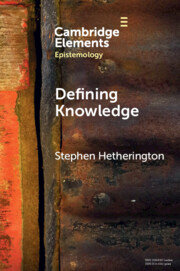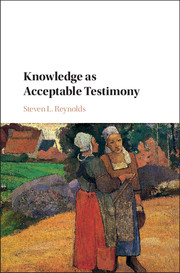Knowledge and the Gettier Problem
£30.99
- Author: Stephen Hetherington, University of New South Wales, Sydney
- Date Published: January 2019
- availability: Available
- format: Paperback
- isbn: 9781316603970
£
30.99
Paperback
Other available formats:
Hardback, eBook
Looking for an inspection copy?
This title is not currently available on inspection
-
Edmund Gettier's 1963 verdict about what knowledge is not has become an item of philosophical orthodoxy, accepted by philosophers as a genuine epistemological result. It assures us that - contrary to what Plato and later philosophers have thought - knowledge is not merely a true belief well supported by epistemic justification. But that orthodoxy has generated the Gettier problem - epistemology's continuing struggle to understand how to accommodate Gettier's apparent result within an improved conception of knowledge. In this book, Stephen Hetherington argues that none of epistemology's standard attempts to solve that problem have succeeded: he shows how subtle yet fundamental mistakes - regarding explication, methodology, properties, modality, and fallibility - have permeated those responses to Gettier's challenge. His fresh and original book outlines a new way of solving the problem, and an improved grasp of Gettier's challenge and its significance is the result. In a sense, Plato can now embrace Gettier.
Read more- The most detailed critical engagement with the Gettier problem in over thirty years
- Takes epistemological discussion of the Gettier problem in some surprising new directions
- Challenges key ideas and moves within recent epistemological thinking about knowledge's nature
Customer reviews
Not yet reviewed
Be the first to review
Review was not posted due to profanity
×Product details
- Date Published: January 2019
- format: Paperback
- isbn: 9781316603970
- length: 253 pages
- dimensions: 228 x 153 x 13 mm
- weight: 0.35kg
- availability: Available
Table of Contents
Part I. Introducing Gettierism:
1.1. The year of Gettier
1.2. Gettierism introduced
1.3. Gettier cases introduced
1.4. Gettierism refined
1.5. Gettierism finalised: individual-Gettierism versus property-Gettierism
1.6. Gettieristic responses to Gettier cases
1.7. Supporting Gettierism
Part II. Explicating Gettierism: A General Challenge:
2.1. Introduction
2.2. The fallibilism underlying Gettierism
2.3. A general anti-Gettierism argument
2.3.1. The strategy
2.3.2. The argument
2.3.3. Objection: merely definitional?
Part III. Explicating Gettierism: A Case Study:
3.1. Introduction
3.2 Veritic luck
3.3. The argument
3.4. The argument, more metaphysically
3.5. An alternative Gettieristic interpretation of safety?
3.6. Belief-forming methods
3.7. The backward clock
3.8. The anti-luck intuition supplanted
Part IV. Explicating Gettierism: Modality and Properties:
4.1. Introduction
4.2. Objection: modal fallacy?
4.2.1. The objection
4.2.2. The property of being Gettiered
4.2.3. Property preclusion
4.2.4. Predicates for the property of being Gettiered
4.2.5. Property analysis
4.3. Objection: another modal fallacy?
4.3.1. The objection
4.3.2. The objection's failure
4.3.3. Individual-Gettierism versus property-Gettierism, again
Part V. Explicating Gettierism: Infallibility Presuppositions:
5.1. A question
5.2. Some Gettieristic reasoning
5.3. Realistic possibilities?
5.4. A case study: virtue-theoretic manifestation
5.4.1. Sosa/Turri's Gettieristic proposal
5.4.2. Fallibilism within Gettier's challenge
5.4.3. Turri's unwitting infallibilism
5.4.4. A methodological moral
5.4.5. Manifestation clarified
5.5. Conclusion
Part VI. Gettierism and its Intuitions:
6.1. Intuitive support?
6.2. Gettier's fallibilism, again
6.3. A methodological moral, again
6.4. A methodological question about Gettieristic assessments
6.5. A methodological problem for Gettieristic assessments
6.6. An objection and two replies
6.7. Conclusion
Part VII. Gettierism Improved:
7.1. A compatibilist aim
7.2. An old-fashioned account of not being Gettiered
7.2.1. An internalist condition
7.2.2. A fallibilist condition
7.2.3. A non-reductive condition
7.3. A non-reductive justified-true-belief conception of knowledge.
Sorry, this resource is locked
Please register or sign in to request access. If you are having problems accessing these resources please email [email protected]
Register Sign in» Proceed
You are now leaving the Cambridge University Press website. Your eBook purchase and download will be completed by our partner www.ebooks.com. Please see the permission section of the www.ebooks.com catalogue page for details of the print & copy limits on our eBooks.
Continue ×Are you sure you want to delete your account?
This cannot be undone.
Thank you for your feedback which will help us improve our service.
If you requested a response, we will make sure to get back to you shortly.
×







